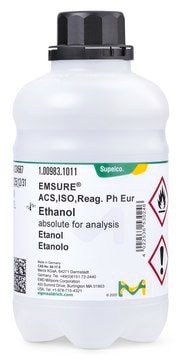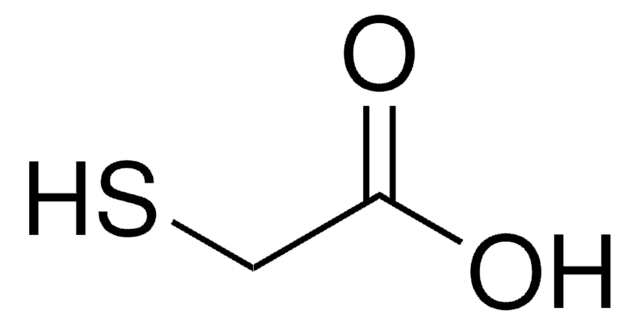1.01737
Barium hydroxide octahydrate
for analysis EMSURE® ACS,ISO,Reag. Ph Eur
Synonim(y):
Barium hydroxide octahydrate, Caustic baryta, Barium oxide hydrate octahydrate
About This Item
Polecane produkty
klasa czystości
ACS reagent
Poziom jakości
agency
reag. ISO
reag. Ph. Eur.
linia produktu
EMSURE®
Próba
≥98.0% (acidimetric)
Postać
solid
siła działania
550 mg/kg LD50, oral (Rat)
zanieczyszczenia
≤0.005% Substances insoluble in dilute hydrochloric acid
pH
14 (20 °C in H2O, saturated aqueous solution)
mp
78 °C
gęstość
2.18 g/cm3 at 20 °C
gęstość nasypowa
900‑1100 kg/m3
ślady anionów
carbonate (as BaCO3): ≤2.0%
chloride (Cl-): ≤0.001%
sulfide (S2-): ≤0.0005%
ślady kationów
Ca: ≤0.002%
Fe: ≤0.0005%
K: ≤0.01%
Na: ≤0.01%
Pb: ≤0.001%
Sr: ≤0.5%
heavy metals (as Pb): ≤0.0005%
temp. przechowywania
2-30°C
InChI
1S/Ba.10H2O/h;10*1H2/q+2;;;;;;;;;;/p-2
Klucz InChI
ZUDYPQRUOYEARG-UHFFFAOYSA-L
Zastosowanie
- Determination of phosphorylated and O-glycosylated sites by chemical targeting (CTID) at ambient temperature.: This study explores the use of chemical targeting to identify phosphorylated and O-glycosylated sites, essential for understanding protein modifications. Barium hydroxide is utilized for its effectiveness in ambient temperature conditions, contributing to more efficient analytical methods (Hathaway, 2007).
- Wet-chemical synthesis of crystalline BaTiO3 from stable chelated titanium complex: formation mechanism and dispersibility in organic solvents.: The research demonstrates the wet-chemical synthesis of BaTiO3, highlighting the formation mechanism and its dispersibility. Barium hydroxide plays a crucial role in stabilizing the chelated titanium complex, making it a valuable component in material synthesis and analytical chemistry (Pramanik et al., 2006).
- Synthesis and analgesic effect of normorphine-3- and -6-glucuronides.: This paper details the synthesis of normorphine glucuronides, where barium hydroxide is used in the synthetic process. The study contributes to the understanding of analgesic properties and the chemical synthesis of pharmacologically relevant compounds (Oguri et al., 1989).
Komentarz do analizy
Substances insoluble in dilute hydrochloric acid: ≤ 0.005 %
Carbonate (as BaCO₃): ≤ 2.0 %
Chloride (Cl): ≤ 0.001 %
Sulphide (S): ≤ 0.0005 %
Heavy metals (as Pb): ≤ 0.0005 %
Ca (Calcium): ≤ 0.002 %
Fe (Iron): ≤ 0.0005 %
K (Potassium): ≤ 0.01 %
Na (Sodium): ≤ 0.01 %
Pb (Lead): ≤ 0.001 %
Sr (Strontium): ≤ 0.5 %
Corresponds to ACS,ISO,Reag. Ph Eur
Informacje prawne
Hasło ostrzegawcze
Danger
Zwroty wskazujące rodzaj zagrożenia
Zwroty wskazujące środki ostrożności
Klasyfikacja zagrożeń
Acute Tox. 4 Inhalation - Acute Tox. 4 Oral - Skin Corr. 1B
Kod klasy składowania
8B - Non-combustible corrosive hazardous materials
Klasa zagrożenia wodnego (WGK)
WGK 1
Temperatura zapłonu (°F)
Not applicable
Temperatura zapłonu (°C)
Not applicable
Certyfikaty analizy (CoA)
Poszukaj Certyfikaty analizy (CoA), wpisując numer partii/serii produktów. Numery serii i partii można znaleźć na etykiecie produktu po słowach „seria” lub „partia”.
Masz już ten produkt?
Dokumenty związane z niedawno zakupionymi produktami zostały zamieszczone w Bibliotece dokumentów.
Klienci oglądali również te produkty
Nasz zespół naukowców ma doświadczenie we wszystkich obszarach badań, w tym w naukach przyrodniczych, materiałoznawstwie, syntezie chemicznej, chromatografii, analityce i wielu innych dziedzinach.
Skontaktuj się z zespołem ds. pomocy technicznej












